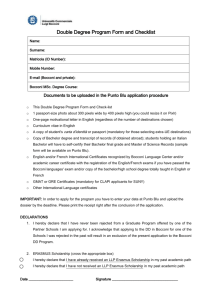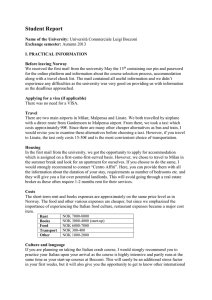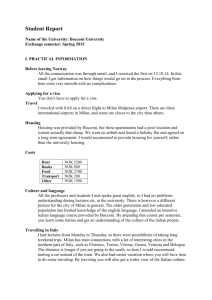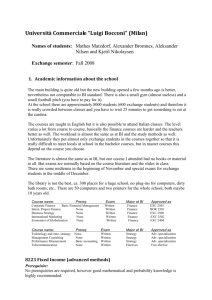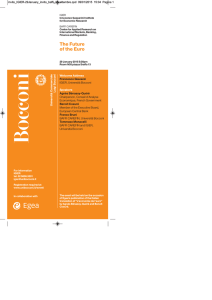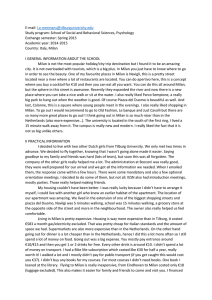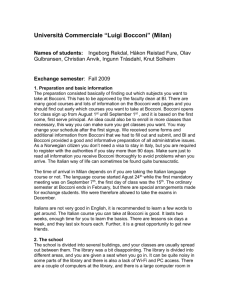Go Global with Fisher
advertisement
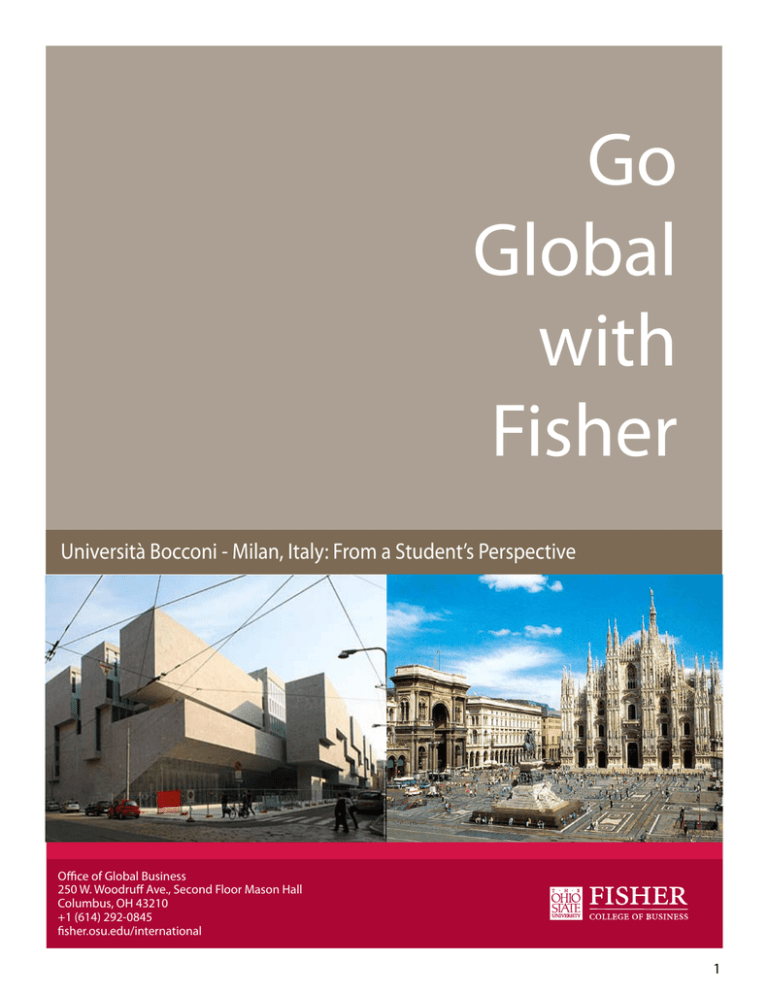
Go Global with Fisher Università Bocconi - Milan, Italy: From a Student’s Perspective Office of Global Business 250 W. Woodruff Ave., Second Floor Mason Hall Columbus, OH 43210 +1 (614) 292-0845 fisher.osu.edu/international 1 Università Bocconi - Milan, Italy: From a Student’s Perspective This booklet is designed by past Student Exchange participants in order to share their experience and knowledge with students participating in the Fisher International Student Exchange. Items in this booklet are not endorsed by the Office of Global Business at Fisher College and information contained in this booklet is subject to change. Accommodations University Housing • Students are recommended to take advantage of the dorms offered by the university. They are internationally diverse and exciting. This can be a great way to meet people. • Arcobaleno Residence – This university housing option is approximately 25 minutes from the university by tram. Students are advised to take the 15 tram (not the 3) arriving at the Castelbarc stop. • If a student chooses to live in the dorms, he or she is encouraged to pay their rent all at once. The administrators should give students this option, but if they don’t, ask! It is a pain to make rent payments each month and students in the past have found it to be confusing and frustrating. (2012) • The security deposit can be collected from the bank at Bocconi at the end of stay. • Dorms include a single bed, closet with a few hangers, 3 drawers, shelves, desk, and a computer chair. Each individual will have a single room that shares a bathroom with one other student. A common kitchen is available on each floor, and pots and pans are provided. • No WiFi in the dorm, but LAN cables are provided. (2013) • Towels and linens are not provided, but can be purchased or packed. • Anyone planning to use products such as hair straighteners, dryers, clippers or other electronic personal care items are encouraged to purchase these while abroad as the conversion from US to European power can ruin the device (unless the device can function with both 110 and 220-240 volts). • Past students have recommended the Arcobaleno or Dubini residence. Most of the international students live in Arcobaleno but it is farther away from campus, while a lot of local students live in the newer residence hall Dubini, which is closer to campus. • Expect to pay about 600 euro a month for housing, which is expensive compared to the rest of Europe. • Italians are very conservative about energy, so the apartment or dorm may be cold at times. The heat is only on at designated times. Apartment Search • Students looking for accommodation on their own may attempt to find apartments around Bocconi’s campus or in the Navigli area. • Facebook Marketplace can be a great way to find a sublease for the semester. Just as Fisher students are traveling abroad during the fall, so too are students from Italy. • Beware of Craigslist. There are a number of scams out there and it has happened to Fisher students in the past. 1 Università Bocconi - Milan, Italy: From a Student’s Perspective If you are unsure, ask for help from the Office of Global Business staff. • The rental agency Home2home can also be helpful in securing accommodations in Milan: http://www. home2home.it/en/ Documents Passports • Passports should be secured as soon as possible. They are required for not only travel overseas, but also for application to Bocconi among other things. • Check the expiration date on your passport. In the past students have failed to realize that their passports expire during their trip which can cause serious issues with reentry to the United States. • It is a good idea to keep several copies of all relevant documents on you at all times: licenses, residency cards, passports, visas, enrollment verifications, whatever has been issued to you. This is not required but you may find yourself in a situation in which these things would be extremely helpful to have and save time. Student Visa • A student visa is required for students traveling to Italy. It is strongly advised to prepare in advance and process your Italian visa as soon as possible. Students are also advised to make multiple copies of all visa application documents and take with them to Italy. (2013) • Students in the past have said that the turnover time was quick and takes approximately 2-4 weeks for US Citizenship holders. This may take longer for other nationalities. • Ohio students must go to the Italian consulate in Detroit. It is recommended that when traveling to the consulate to apply for a Visa, students be sure to have all paperwork and identification required. Having to return from the consulate empty handed can be stressful and can put a strain on timing concerns for international travel. • If you wish to apply by mail you have to sign the application form in front of one of the Dependent Consular Officers or Consular Correspondents near your area prior to mailing it to Detroit for processing. (2012) • Past students have noted that sometimes the vice consulate in Cleveland can review application materials and send these to the consulate in Detroit. This may be worth looking into for some students. Although, be aware that the open hours for the vice consulate in Cleveland are limited and subject to change. (2013) • Past U.S. students have applied using the Type D visa form (for more than 90 days of stay) and collected the following documents for the visa application: Valid passport, One photograph, U.S Express Mail envelope, Letter of Acceptance/ Enrollment into Academic Program in Italy, Affidavit of Support, Affidavit of Insurance Coverage, Airline Ticket, and Proof of Lodging. (2012) • For a list of required documentation and visa application materials, students can visit: http://www.consdetroit. esteri.it/Consolato_Detroit/Menu/I_Servizi/Per_chi_si_reca_in_italia/info.htm. Although some aspects of this website are outdated, it is still very helpful and informative. All the information regarding the Dependent Consular Offices and Consular Correspondents can also be found here. (2012) • It can be very difficult to get a hold of anyone via email, so it is recommended you call if you have any questions regarding the visa application process. (2012) • If students have any questions about obtaining a visa, Travel Solutions can help. Found here: http://controller.osu. edu/travel/travel-agencies.shtm. Or call Travel Solutions by phone at 877-678-8785 or 614-750-4020, ask for a Visa Expert. 2 Università Bocconi - Milan, Italy: From a Student’s Perspective Permit of Stay • The rule is that within the first eight days upon arrival, students must go to the police station (Questura) to get a “stay permit.” The cost is around 150 euros. You must pay for the 17 euro mail stamp fee for a return envelope. It will take about three weeks to obtain the permit. (2012) • This is a permit to stay in the coun1try and not a residence card; it is not obligatory for a foreigner to have residency in Italy provided they have a valid stay permit and are therefore registered in the commune. • Students in the past have said to prepare making multiple trips to the police station for the permit of stay interview. • Also, the questions are in Italian, so getting a fluent friend to help you would expedite the process. • Some students in the past have said that getting this is not worth it. Health Insurance • Ohio State requires that outgoing students purchase the HTH Supplemental Insurance; this will cover the student’s time while studying. However, if a student decided to travel before or after specific program dates, the HTH supplemental insurance will not cover any illness or injury. It is recommended that students contact their health insurance providers before traveling. In the case that a student requires medical attention out of the HTH time period, it is important to know how to deal with copayments, insurance, etc. Specific questions about health insurance can be directed to the Office of International Affairs (OIA). Proof of enrollment • This documentation will be necessary in situations such as in-country banking along with purchasing Student Travel Cards for use of public transportation. • Proof of enrollment documents can be printed out at Bocconi using the PUNTOBLU machine. University administrators can answer questions about this. Italian Personal Code • Students will receive information about this at orientation. It is required for certain transactions such as purchasing tickets for soccer matches. Food and Drink Open-air Market • Milan offers an open-air market every Wednesday from 8:00 to 1:00. This can be found along the tram 15 line at the same stop as Bocconi. Grocery Stores • EsseLunga is within walking distance from the Arcobaleno Residence. They take credit cards. Unlike in the US, shoppers are required to weigh their own produce and then print a sticker to take to the register. • Standa is a quick tram ride for students living in the dorm. It is located three stops via tram 15 or 3. Items and brands differ from those sold at EsseLunga. 3 Università Bocconi - Milan, Italy: From a Student’s Perspective Bocconi Cafeteria and Food Plan • There is a cafeteria in the basement of the main building at Bocconi. It is nice for a quick bite to eat in between classes, but because of all of the other incredible food options in Milan, the food plan is not recommended. Aperitivo • This evening activity is very common throughout all of Italy and is absolutely amazing! Patrons pay, grab a drink and then help themselves to appetizers. This is offered at most restaurants in the evening, similar to a happy hour. Costs range from 5 to 15 Euro. • There is a boat located on the canal near Ristorante Delle Mole that offers aperitivo. This is highly recommended by past students. Ristorante Delle Mole is located at Via Scoglio di Quarto, 3, 20136 Milan, but students are advised to just, “look for the boat!” Dining • Trattoria Toscana is an adorable restaurant in Navigli located along the tram 3 line by the Levi’s store. When weather permits, the restaurant opens the roof to reveal a courtyard atmosphere. • Café Pizzino pizza is THE BEST! This is a great place to dine and is just a short walk from Bocconi. The address is Viale Bligny 22, Milan. • Bocconi Giusti is also a short walk from Bocconi but unlike the formal atmosphere of Pizzino’s, Bocconi Giusti offers amazing Panini’s and pizza by the slice in a cheap, grab and go style. The address is Viale Bligny 19, Milan. • Maya Mexican offers great Mexican food and drinks as well as aperitivo. The restaurant is located along the Canals in Navigli. The address is Via Cardinale Ascanio Sforza 41, 20136 Milan. • Piada and Brusca is a sandwich shop across from Bocconi Giusti that offers great flatbread sandwiches (piade). Seating is available. • Doner Kebab is an inexpensive option located all around the city. Kebab, fries and a drink can be purchased for about 5 Euros. • La Rinascente is a VERY upscale department store in the center of town, near the Duomo. A restaurant located on the top floor offers awesome food. It can be a little expensive, but well worth it for a special occasion! • Moscova is a young area with lots of shopping, fun, and great food. Take the Metro green line (2) and get off at Moscova. • Gelateria Orsi is along tram 3 line. The green apple gelato is out of this world! The address is Via Evangelista Torricelli 19, 20136 Milano, Italy • “Luini’s” is where you could get the best food in Milan. • “Chocolat: Italiano” (across the street from Luini’s”) is the best gelato in Italy. 4 Università Bocconi - Milan, Italy: From a Student’s Perspective Money Using an ATM • Though additional costs may be incurred, using an American bank card at an ATM (Bancomat in Italian) can be a quick and easy way to withdraw cash. Withdrawals will be made in Euros but will show up on an account statement as withdrawals in the appropriate amount of dollars. It is best to check with one’s American bank to estimate the additional expenses of foreign withdrawals. • Often cash is the best way to purchase items while both traveling and in country, but carrying very large amounts can be dangerous. • Bancomats are readily available and easy to find. There is a bank at Bocconi with a Bancomat. • It is recommended to have multiple sources of money because even though calling ahead of time to prevent blockage of cards will help, some banks can still put holds on accounts. • It is also recommended to have some Euros on hand before arriving to Europe. Establishing a bank account in your host country • Though it is possible to open a bank account in Italy, it is unnecessary for students that plan to live in university housing. • For students that find accommodation on their own and must pay utilities via money transfer, a non-resident account (conto estero) may be established. Further information should be researched by the student. Credit and Bank Cards • Bank cards are not accepted except for use with ATMs. • Write down the customer service numbers on all of your credit cards and keep the numbers with you in case your card gets stolen and cancellation is necessary. • Capital One offers credit cards that do not charge international fees. This can save a significant amount over the duration of travel. Travelers Checks • Though traveler’s checks may have once been the safest way to manage money while traveling, they may not be the best option. Traveler’s checks are only good once converted to Euros. Therefore, if a student plans to use traveler’s checks, it is recommended that this be only part of the whole money management scheme. Other • Past students have recommended having backup solutions to problems you might face in advance. For example losing your credit card. Come up with a backup plan to what you would do if this were to happen because it takes a while to get a new credit card to be sent overseas. (i.e.: have a second credit card stored in a different place, pay for the entire group dinner when going out and then have everyone pay back in cash, etc.) (2013) • Past students have recommended making a rough budget 5 Università Bocconi - Milan, Italy: From a Student’s Perspective for your expenses abroad to avoid missing out in activities at the end of the semester. For example, one student limited her expenses to $2000 a month while abroad. (2013) For more information about using credit cards and ATMs abroad and the related fees, visit http://www.flyerguide.com/ wiki/index.php/Credit/Debit/ATM_Cards_and_Foreign_Exchange Phone and Internet Using a phone from home • If planning to use a phone from home, do your homework with respect to cost. In the past, students have realized that using devices such as smartphones with international capabilities can be much more expensive than planned. The upside of using a smartphone is the ability to use the free communication apps to keep in touch with friends and family at home. • An international SIM card will be necessary, and can be purchased at a phone outlet upon arriving. This has proven to be the best option for students. Some iphones may or may not be able to be used abroad. Talk to your cell phone carrier before going aboad. Buying an international phone • Students can go to any of the phone providers in Italy to purchase a prepaid phone with top up credit (phone time). After the initial purchase students can buy top up credit at grocery or convenient stores (tabaccherie) around the city. • One recommended carrier is Wind. This carrier offers free in-calling for students on campus plans. Students may either purchase a Wind phone from the Wind store, or can use an unlocked phone with a Wind SIM card. • Unlocked phones are available at various phone outlets and electronics stores. An unlocked phone will support the SIM card of any carrier. This option is recommended so that when traveling to another country for an extended period, a student can purchase a SIM card package with another provider if necessary. • Phones and plans can be as cheap or expensive as the student makes them. An unlocked phone can be purchased anywhere from 20 euro, and top up can cost anywhere from 20 to 50 euro per month depending on usage. International Communication • When calling home, Skype video use is free with wifi access! This is a great option for keeping in touch with friends and family from home as well as those met while traveling. o Help parents and friends set up and learn how to use Skype before traveling. o Purchasing Skype credit allows students to call a landline or a cell phone back home at a lower rate. When internet is available this can reduce the hassle involved with international calling cards. Users can also pay $6-$10 for a month of unlimited calls to any landline or cell phone in the U.S. from their computers. • G-chat is also a favorite channel of communication for students. It has a G-Video option as well. It can be more convenient than Skype because it is more user-friendly. Which mode of communication you choose ultimately depends on your preferences. It is recommended to explore both programs before departure so you can inform family members which you will be using. • If you want friends to be able to call you, leave voicemails, or leave text messages like a regular cell phone, you can 6 Università Bocconi - Milan, Italy: From a Student’s Perspective sign up for Google voice. You will need to use a VPN (virtual private network) but students have said that it is well worth it. With Google voice, you receive a US telephone number that works like a landline. If you have to make business calls while abroad, this can be a great tool! For more information go to: http://www.google.com/googlevoice/about.html. • Viber app allows you to make free calls and texts through wifi (2012). Internet • University housing provides students with a small Ethernet cord that will work from the wall to the desk. For more range of use, a longer cord is recommended. Wireless is not available in the dorm. • Bocconi offers wireless internet service on some parts of campus, however most classrooms do not have wifi. Ask a university administrator about how to get set up. • There is a computer lab at Bocconi that offers day time use of internet and printing. Unfortunately these are quite slow and not always dependable. • An option to get wireless internet is called chiavetta internet. This device plugs into the computer’s USB port and connects to the internet. Students can top up the chiavetta as they would a cell phone. The device can be purchased at cell phone retailers and it allows students to get wireless internet wherever there is cell phone coverage. Safety Tips • Cars in Milan drive fast and are not always weary of pedestrians. Use caution when crossing the street. • While some hostels offer storage lockers, others do not. Having both luggage locks and a combination lock can come in handy when traveling. • When traveling on trains, watch out for luggage theft. • Purse theft is common. Especially when out at clubs and on trains, keep purses zipped and close. Belongings will get stolen if students are not cautious. • Be aware of all surroundings and keep your personal items close at all times. If staying in hostels it is advised to bring a lock to protect your valuables. Avoid bringing anything of extreme sentimental value. • Keep emergency numbers specific to your host country with you at all times. • Men are often much more aggressive on how they approach women than you may be used to in the US. The best advice is to ignore them as much as possible and they will leave you alone. (2012) • Protests were frequent in 2012, make sure to be aware of this an avoid being caught up in one. Also, transportation may be affected on these days. (2012) • Pick-pocketing is very common in Italy, especially in clubs, on the trams and while traveling. Keep all belonging very close to you and don’t leave them sitting anywhere in public for any amount of time. (2012) Travel Public Transportation • Milan’s Public Transportation is called ATM. This system consists of above ground trams, underground Metro lines, buses and a newly operating bike sharing service. Public transportation is strongly recommended. • The first priority after landing in-country is to get a tram pass as soon as possible. The earlier you get one, the 7 Università Bocconi - Milan, Italy: From a Student’s Perspective • • • • • • • • • • faster the process goes for obtaining it. Some students who applied to get one early was able to get it in about a week where students who waited took a 1 month, and incurred individual ticket cost to use the tram while waiting for the tram pass to be delivered. A travel card is necessary for use of public transportation. It is recommended to purchase a Student Travel Card as soon as possible (within a few days of being in country). Until this is purchased, students will be required to buy individual rider passes which can add up and become expensive quickly. Individual passes as well as Student Travel Cards can be purchased at any ATM Point or authorized outlet which include various bars, newsstands, tobacconists, stationers, etc. Students must present a valid passport. Students will fill out a Card Request Form which must be completed in full with all the information requested and returned with proof of enrollment at the university. (2012) Students will find that it is sometimes possible to ride without a travel card, but beware, being caught without a pass leads to a 70 euro fine! ATM workers will require immediate payment or they will collect identification information for future payment. Past students have sworn by Google Maps. Google lists the tram and tram stops. When scrolling over the tram icon, the line number and the name of the stop will appear. An “M” means Metro access. For more information about ATM, visit: http://www.atm-mi.it/en/Pages/default.aspx Information about bike sharing can be found at: http://www.bikemi.com/ Plane and train tickets are much cheaper ahead of time. It is also important to look into hostels, maps, public transportation in the city, points of attraction, etc. This can substantially increase the excitement of the trip. Because of the ease of travel, many students have travelled a lot more than originally expected. When budgeting, take this into consideration. Past students have had success in staying in famous hostels. Italy is not known for having the best hostels, but those that are well known are generally cleaner and safer. A great website for hostels is: http://hostelworld.com Items to pack that may come in handy include a combination lock, mini flashlight, band aids, emergency cash, etc. Be aware of bag dimensions for all mode of travel. Airline companies are not lenient and will charge heavy fees if your bag is bigger than their specifications. Taxis • Be aware of unofficial taxis that will charge you much more than regular. Unofficial taxis usually don’t have advertisements on the side of the cars. (2013) • Official taxis usually are white or yellow cars with taxi numbers and an advertisement on the side of the car. (2013) Trains • Both international and domestic trains to and from Milan are available from Milan Central Station. Tickets can be purchased ahead of time or at the station before boarding. It is important to note that validation of tickets is 8 Università Bocconi - Milan, Italy: From a Student’s Perspective required prior to boarding. The machines that validate tickets are located on the train platforms. Failing to validate can result in expensive fines or possibly imprisonment. Information about travel via rail can be found at the following website: http://www.trenitalia.it • Trains are used for travel around Italy. During the first weeks, students have explored Italy and booked flights for upcoming weekends. The more advanced you book a flight, the cheaper the cost. However, booking before you enter the country or see your class schedule, and the schedule of your fellow exchangers is not advised. Students have recommended avoiding AirBerlin if possible, due to their frequent delays and cancelations. • Eurorail passes are not always cost efficient. They are more efficient for backpacking. Exchange students usually travel for weekend trips to one area at a time so plane is recommended. International Travel • When traveling between countries, make sure to follow and complete all visa requirements for all countries you plan to visit. • Flights around Europe can be relatively inexpensive when flying with low cost carriers. Recommended airlines are Ryanair (www.Ryanair.com), Easyjet (www.easyjet.com), and BMIBaby (www.BMIbaby.com). Tuesday is the best day to find the cheapest flights. (2012) • A great site for looking up flight costs is www.Skyscanner.com. This allows students to find the cheapest flights to anywhere from any airport. For a weekend traveler that doesn’t care where they end up (as long as it’s cheap), this site is perfect. The site combines Ryanair and Easyjet among other low cost carriers. • These airlines are the cheapest and most used by students. Be aware that because of their price they have more of a likeliness of being cancelled or delayed. Be prepared, you are bound to encounter one travel glitch, take it in stride! • For the flight over to Milan and back, utilize StudentUniverse.com. Students have had great luck with affordable prices. • Do not use priceline.com for cheap air prices. While it may be practical, if cancelled they will not reschedule unless a new flight goes to the exact same cities, which may not happen for an extended period of time. • Print out all boarding passes prior to your flight. Additional fees can be imposed for the travelers who have not done so. • Look into all bag size requirements. All modes of transportation will check to make sure that the bag has the right weight and dimensions. If it is too heavy or too big they will ask you to check it and pay another fee. • Malpensa is the large scale international airport in Milan. From the airport, students can use the Malpensa Express to travel to Cadorna train station in Milan. This is a high speed train that costs approximately 12 euro each way or 16 euro round trip. This train takes around three hours round trip. (2012) • Bergamo Airport is Ryanair’s main hub in Milan. Buses leave from Milano Central Station for Bergamo every 15-20 minutes, reflecting popular flight times. This bus company offers a buy-two-get-one-free deal on tickets which can be purchased at the news stand near the pick-up/drop-off. The bus area is on the right side of the building as you walk in from the main entrance. • Milan Linate Airport is the closest and most convenient airport to Bocconi and mainly serves domestic flights. Students highly recommend using this airport for domestic flights if possible. (2012) • For purposes of scheduling flights home or additional travel, in the past the final date for exams has been December 21 (booking your flight on December 23 is probably safe.) Some students decide to wait to book their flight home. In case they decide to spend additional time traveling after the semester ends. Places to Visit • Places that students recommend seeing while in Europe include Vienna, Prague, Budapest, Cinque Terre, Brussels, Monaco, and Barcelona, National Cemetary, Parco Sempione, Any Aperitivo (Navigli) 9 Università Bocconi - Milan, Italy: From a Student’s Perspective University Tips University Information • Small but nice school and different feel from Ohio State University. (2013) • No student organizations, but do have language partner arrangements. (2013) Courses • Generally, Bocconi is known to be one of the most time-consuming and difficult programs offered as an exchange through Fisher. It is recommended to take three courses in total which satisfies minimum required enrollment, but does not overload the student. • Because Bocconi is famous for economics, the courses in this subject area are quite difficult and strenuous. Only students with a serious interest in economics are encouraged to take any economics courses. • Marketing majors are encouraged to take the course in Sales Management. Past students have found that while less difficult than other classes offered at Bocconi, this course is highly interesting and engaging. • Take the fashion course! Though this does not count for specific credit at Fisher, it is fun and exciting. Milan is a one of the fashion capitals of the world, and it is nice to get a better understanding of the fashion world while there. • Class times and rooms change constantly so check schedules daily! • Grades at Bocconi consist of a final and occasionally an optional midterm, so be ready to hit the books hard at least a week or two in advance. • The faculty speaks English at varying degrees of proficiency; some are easy to understand and others are difficult. • Office hours for faculty can be intimidating; remember to be patient and exercise respect, as there is more of a disparity between students and professors in Italy than in the United States. • OSU language courses are typically post-evaluated for equivalency. if you are planning to take language courses abroad, keep this in mind. If you are in a language minor, talk with you academic advisor regarding taking language courses abroad. University Offered Resources • The campus tour offered during orientation is recommended. This is a great way to get settled in a new place and gives students a better understanding of their surroundings. • Utilize Bocconi’s international student program (Erasmus Student Network) and all the events they have planned for you: it is a great way to go out, meet new people and have the time of your life! (2012) • Past students have found the crash course in Italian offered before the start of school frustrating. This course involves seven hours of class each day for two weeks. Each day missed loses a letter grade. This can be very stressful and some students ultimately dropped the course. Despite the difficulty, those who stuck with it have benefitted through better understanding of the language as well as the opportunity to connect with other students before the start of classes. • The university offers a computer lab with printers, but lines for printing are extremely long. Students are encouraged to chip in with other students and purchase a printer. Be aware that these are not nearly as high tech and useful as the ones at Fisher (2012). • Oktoberfest trips can be booked through the school or school affiliated organizations. This has been noted as one of the best times students have had on their trip. Erasmus is one school that coordinates a trip. This is one trip that is recommended however there are many that students can sign up for. Online Resources • The website of the university is very helpful: http://www.unibocconi.eu/wps/wcm/connect/SitoPubblico_EN/ 10 Università Bocconi - Milan, Italy: From a Student’s Perspective Navigation+Tree/Home/Services/?lang=en • www.Hellomilano.it is a website that promotes fun and exciting activities in Milan. This can be a useful resource for students new to the area. • Recommended Facebook groups include: Bocconi; ESEG Milano; and IS@B Miscellaneous Tips Shopping • Fiordaliso Centro Commerciale is an amazing shopping center. Shopping includes a Wind store for cell phones, an electronics store for printer and Ethernet cords, a make-up store, and a supermarket which is great for not only groceries but also school and dorm supplies, toiletries etc. To get there, take tram line 15 heading south to Curiel Maggi (Rozzano). Walk across a large bridge that crosses the street. You can’t miss it, it is huge! The address is: Via Eugenio Curiel 25, 20089 Rozzano MI • La Rinascente is an upscale department store located near Duomo. • Via Buenos Aires offers great stores along the street. Access via the Metro red line. • Via Montenapoleone offers shops such as Dior, Chanel, Prada, and other designer stores. This might not be the best on a student traveling budget, but it can be fun to go and look around! • Navigli offers an antique market on the first Sunday of each month. Language • Students that are not fluent in Italian are encouraged to keep a pocket dictionary for times when language barriers arise, especially in case of an emergency. Tidbits • Soccer (calcio) games – make sure you go see Inter or AC Milan play at least once, it is an awesome experience! Tickets can be purchased at most banks and must be purchased in advance of the match. Students must present both their passport and Italian Personal Code. Getting tickets can be confusing, so ask an Italian student for help. • Pack for all seasons – summer and winter. The temperature in Milan can fluctuate a lot. • Bring peanut butter; it will be a hot commodity when you are there. • One student said that about 20-30% of Milan’s population doesn’t speak English, but that she was able to survive with limited knowledge of Italian. • Bring deodorant from home with you; the deodorant used in Italy is not as strong as those in the US. • Flying to Italy with another student in your program is advisable, as traveling costs and risk of getting lost can be decreased. • It is advised that you be very open minded and patient when you are on exchange. Not everything is going to go your away while abroad and you will hit major road blocks that you’ve never encountered before, but its best to just keep an opened mind and don’t let things get you down. The times that don’t go exactly as planned are going to be the biggest learning experiences. (2013) If there are further questions or concerns, different resources are available that students can utilize. The Office of Global Business will be a resource throughout the entire trip. Past students have also volunteered to be a contact if additional questions would arise. 11 Università Bocconi - Milan, Italy: From a Student’s Perspective Contributors Emily Nace Outbound exchange student to Bocconi Spring 2013 nace.11@osu.edu Kerry Keys Outbound exchange student to Bocconi Autumn 2012 keys.66@osu.edu Melanie Pappas Outbound exchange student to Bocconi Autumn 2012 pappas.182@osu.edu Grace Ubbing Outbound exchange student to Bocconi Autumn 2012 Ubbing.8@osu.edu Kunal Yajnik Outbound exchange student to Bocconi Autumn 2012 yajnik.6@osu.edu Elizabeth Ashley Hanna Outbound exchange student to Bocconi Autumn 2012 Hanna.192@osu.edu Lachelle Trout Outbound exchange student to Bocconi Autumn 2010 trout.54@osu.edu Brina Maydock Outbound exchange student to Bocconi Autumn 2009 maydock.1@osu.edu Lenora Ciraldo Outbound exchange student to Bocconi Autumn 2009 ciraldo.5@osu.edu Brian Folmer Outbound exchange student to Bocconi Autumn 2009 folmer.2@osu.edu Adam Peljieg Outbound exchange student to Bocconi Autumn 2009 paljieg.2@osu.edu Ryan Romes Outbound exchange student to Bocconi Autumn 2009 romes.3@osu.edu Additional Contacts for Further Questions Kozue Isozaki Assistant Director for International Exchange at Ohio State isozaki.1@.osu.edu Valentino Cerboni Inbound exchange student from Bocconi Spring 2013 cerboni.1@osu.edu Rita Bersi Inbound exchange student from Bocconi Autumn 2013 bersi.1@osu.edu Amy Burnham Outbound exchange student to Bocconi Autumn 2009 burnham.22@osu.edu 12
